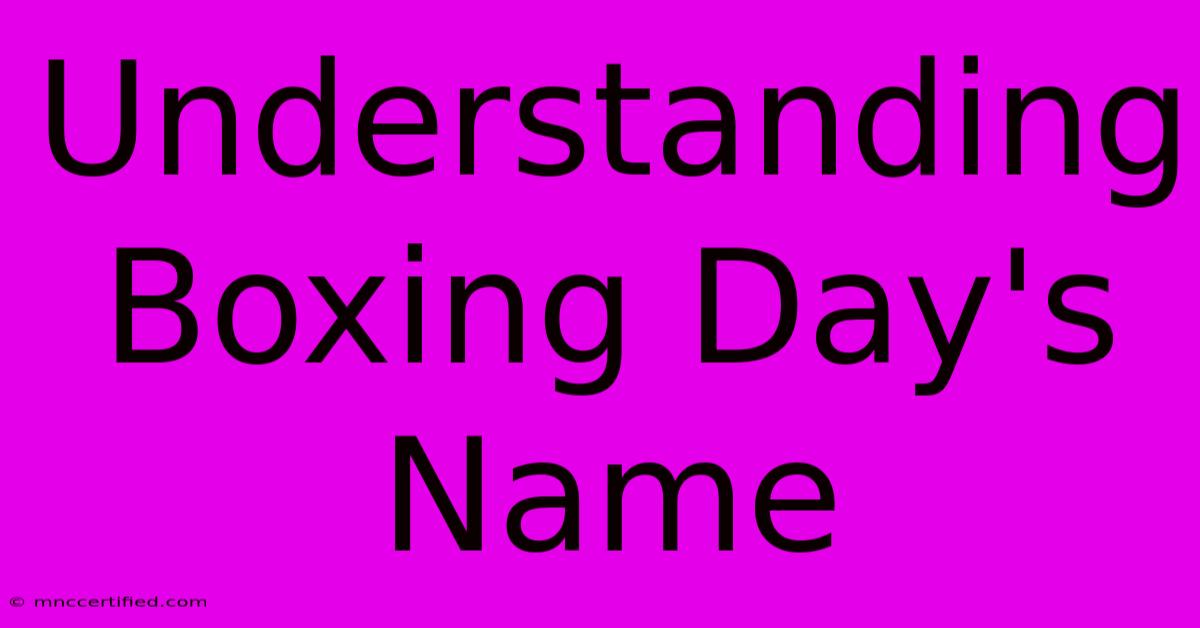Understanding Boxing Day's Name

Table of Contents
Understanding Boxing Day's Name: History, Traditions, and Modern Interpretations
Boxing Day, celebrated annually on December 26th, is a public holiday in many countries, particularly those with historical ties to the United Kingdom. But where did this peculiar name originate? The answer isn't as straightforward as you might think, and unraveling its etymology reveals a fascinating blend of historical practices and evolving societal norms. This article will delve into the various theories surrounding the name "Boxing Day," exploring its rich history and its modern significance.
The Leading Theories: Alms Boxes and Servant's Day
Several compelling theories attempt to explain the origin of the name "Boxing Day." Two of the most prominent are:
1. The Alms Box Theory: Charity and Giving
One widely accepted theory links "Boxing Day" to the practice of giving alms. In the Middle Ages and beyond, wealthy individuals and institutions would place "alms boxes" – containers for charitable donations – in churches and other public spaces. On the day after Christmas, these boxes were opened, and the contents were distributed to the poor and needy. This act of charity, tied to the Christmas season, could have contributed to the association of December 26th with giving and "boxing" up donations. This theory connects the "boxing" to the physical act of collecting and distributing the contents of the boxes.
2. The Servant's Day Theory: Gratitude and Festive Tipping
Another prominent theory suggests that "Boxing Day" originated as a day for servants to receive gifts or "Christmas boxes" from their employers. After serving their masters diligently throughout the year, and particularly during the busy Christmas period, servants were given boxes containing gifts, money, or leftover food. This practice acknowledged their hard work and fostered a sense of mutual respect and goodwill. The "boxes" in this context weren't necessarily containers for charity, but rather personal gifts signifying appreciation. This theory is supported by historical accounts of this specific practice.
Other Contributing Factors: A Blend of Traditions
While the alms box and servant's day theories are the most prevalent, it's likely that the name "Boxing Day" emerged from a blend of these and potentially other contributing factors. The practice of giving gifts and receiving gratuities likely existed across social strata, blurring the lines between charitable donations and personal expressions of thanks.
The term "Boxing Day" itself didn't appear in written records until the 19th century, suggesting that the practice predates the name's widespread adoption. This reinforces the notion that various customs gradually coalesced into the tradition we recognize today.
Boxing Day Today: A Global Celebration
While its origins may lie in centuries-old practices of charity and gift-giving, "Boxing Day" has evolved significantly. In many countries, particularly those within the Commonwealth, it's a significant public holiday. While the tradition of giving to charity and showing appreciation to those who provide services continues in some forms, modern "Boxing Day" is also associated with:
- Family gatherings: Similar to Christmas Day, it's a time for families to come together, often continuing the festive celebrations.
- Sporting events: Many popular sporting fixtures, particularly in the UK, are scheduled on Boxing Day, making it a day of sporting entertainment.
- Sales and shopping: Retailers frequently hold significant post-Christmas sales, capitalizing on the holiday and the post-Christmas spending mood.
Conclusion: A Rich and Evolving Tradition
The name "Boxing Day," while seemingly simple, reveals a complex and fascinating history. Its origins are rooted in the medieval practices of charitable giving and the tradition of servants receiving gifts. Over time, these traditions blended and evolved, resulting in the modern celebration we know today. The name itself remains a testament to the enduring legacy of giving, gratitude, and community spirit during the festive season. Understanding its name offers a deeper appreciation for the rich tapestry of its history and its ongoing relevance in contemporary society.

Thank you for visiting our website wich cover about Understanding Boxing Day's Name. We hope the information provided has been useful to you. Feel free to contact us if you have any questions or need further assistance. See you next time and dont miss to bookmark.
Featured Posts
-
Riley Heat Wont Trade Butler
Dec 27, 2024
-
Wolves Vs Man Utd Cunhas Goal Decides
Dec 27, 2024
-
Wolves Vs Manchester United Live Match
Dec 27, 2024
-
Chengdu Airbase New Jet Confirmed
Dec 27, 2024
-
Roman Kemp Limited Time With Dad
Dec 27, 2024